Effectiveness of Nutrition in Prevention and Control of Diabetes
VerifiedAdded on 2023/06/03
|11
|2927
|392
AI Summary
This research paper explores the effectiveness of nutrition in the prevention and control of diabetes. It evaluates the use of healthful eating patterns as the most effective strategy of preventing and managing diabetes. The paper also recommends further research on the role of plant-based diets in preventing diabetes.
Contribute Materials
Your contribution can guide someone’s learning journey. Share your
documents today.
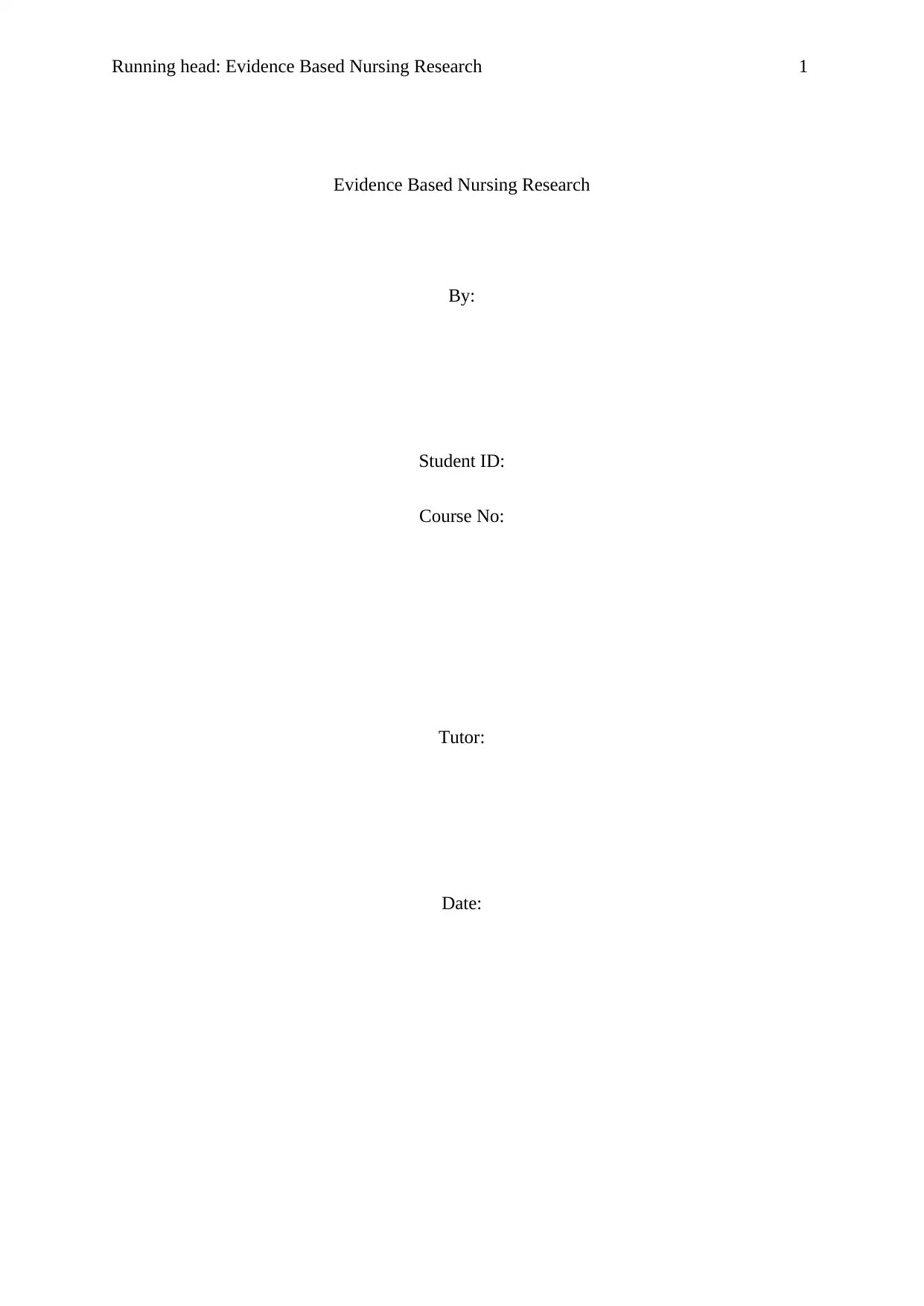
Running head: Evidence Based Nursing Research 1
Evidence Based Nursing Research
By:
Student ID:
Course No:
Tutor:
Date:
Evidence Based Nursing Research
By:
Student ID:
Course No:
Tutor:
Date:
Secure Best Marks with AI Grader
Need help grading? Try our AI Grader for instant feedback on your assignments.
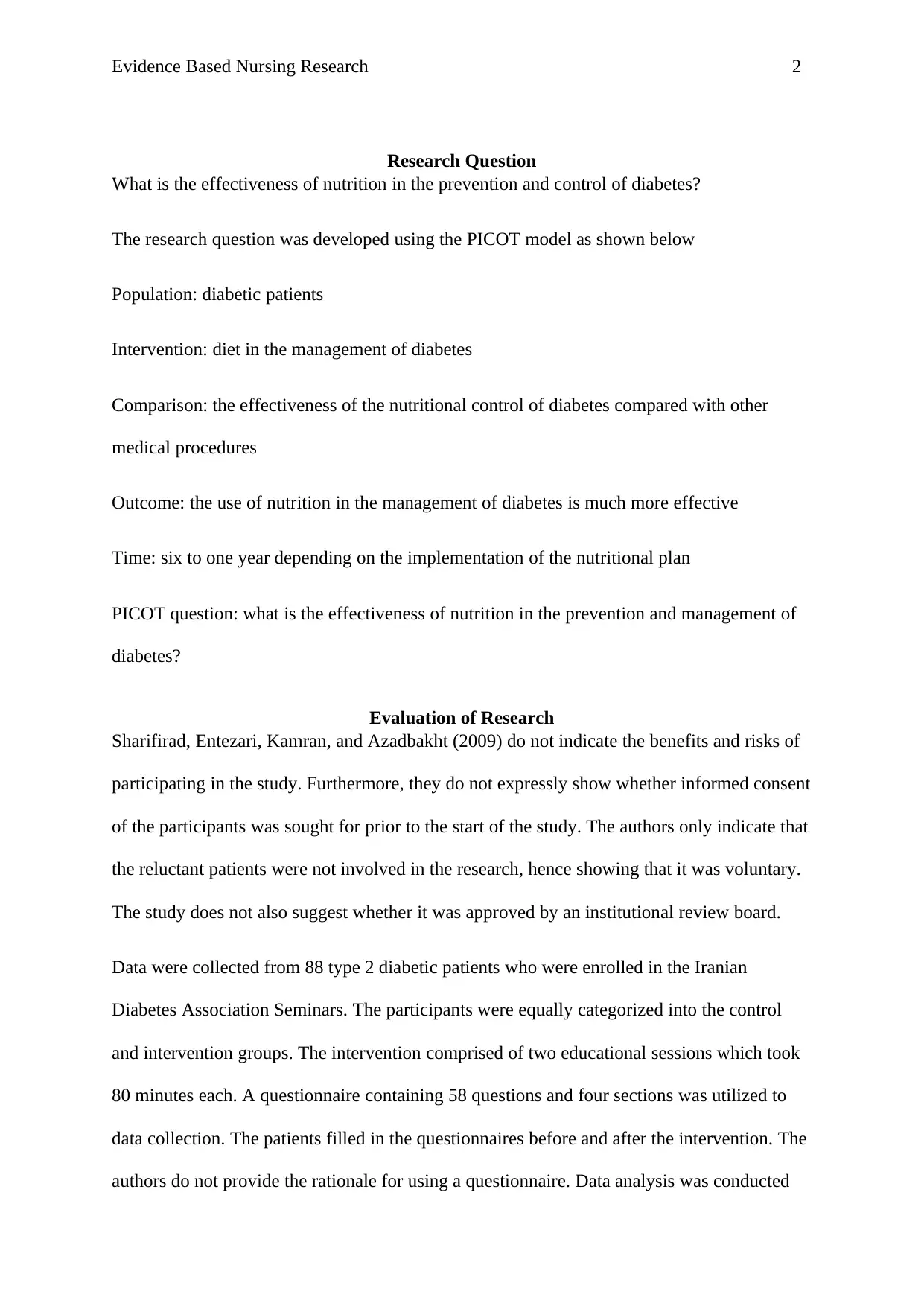
Evidence Based Nursing Research 2
Research Question
What is the effectiveness of nutrition in the prevention and control of diabetes?
The research question was developed using the PICOT model as shown below
Population: diabetic patients
Intervention: diet in the management of diabetes
Comparison: the effectiveness of the nutritional control of diabetes compared with other
medical procedures
Outcome: the use of nutrition in the management of diabetes is much more effective
Time: six to one year depending on the implementation of the nutritional plan
PICOT question: what is the effectiveness of nutrition in the prevention and management of
diabetes?
Evaluation of Research
Sharifirad, Entezari, Kamran, and Azadbakht (2009) do not indicate the benefits and risks of
participating in the study. Furthermore, they do not expressly show whether informed consent
of the participants was sought for prior to the start of the study. The authors only indicate that
the reluctant patients were not involved in the research, hence showing that it was voluntary.
The study does not also suggest whether it was approved by an institutional review board.
Data were collected from 88 type 2 diabetic patients who were enrolled in the Iranian
Diabetes Association Seminars. The participants were equally categorized into the control
and intervention groups. The intervention comprised of two educational sessions which took
80 minutes each. A questionnaire containing 58 questions and four sections was utilized to
data collection. The patients filled in the questionnaires before and after the intervention. The
authors do not provide the rationale for using a questionnaire. Data analysis was conducted
Research Question
What is the effectiveness of nutrition in the prevention and control of diabetes?
The research question was developed using the PICOT model as shown below
Population: diabetic patients
Intervention: diet in the management of diabetes
Comparison: the effectiveness of the nutritional control of diabetes compared with other
medical procedures
Outcome: the use of nutrition in the management of diabetes is much more effective
Time: six to one year depending on the implementation of the nutritional plan
PICOT question: what is the effectiveness of nutrition in the prevention and management of
diabetes?
Evaluation of Research
Sharifirad, Entezari, Kamran, and Azadbakht (2009) do not indicate the benefits and risks of
participating in the study. Furthermore, they do not expressly show whether informed consent
of the participants was sought for prior to the start of the study. The authors only indicate that
the reluctant patients were not involved in the research, hence showing that it was voluntary.
The study does not also suggest whether it was approved by an institutional review board.
Data were collected from 88 type 2 diabetic patients who were enrolled in the Iranian
Diabetes Association Seminars. The participants were equally categorized into the control
and intervention groups. The intervention comprised of two educational sessions which took
80 minutes each. A questionnaire containing 58 questions and four sections was utilized to
data collection. The patients filled in the questionnaires before and after the intervention. The
authors do not provide the rationale for using a questionnaire. Data analysis was conducted
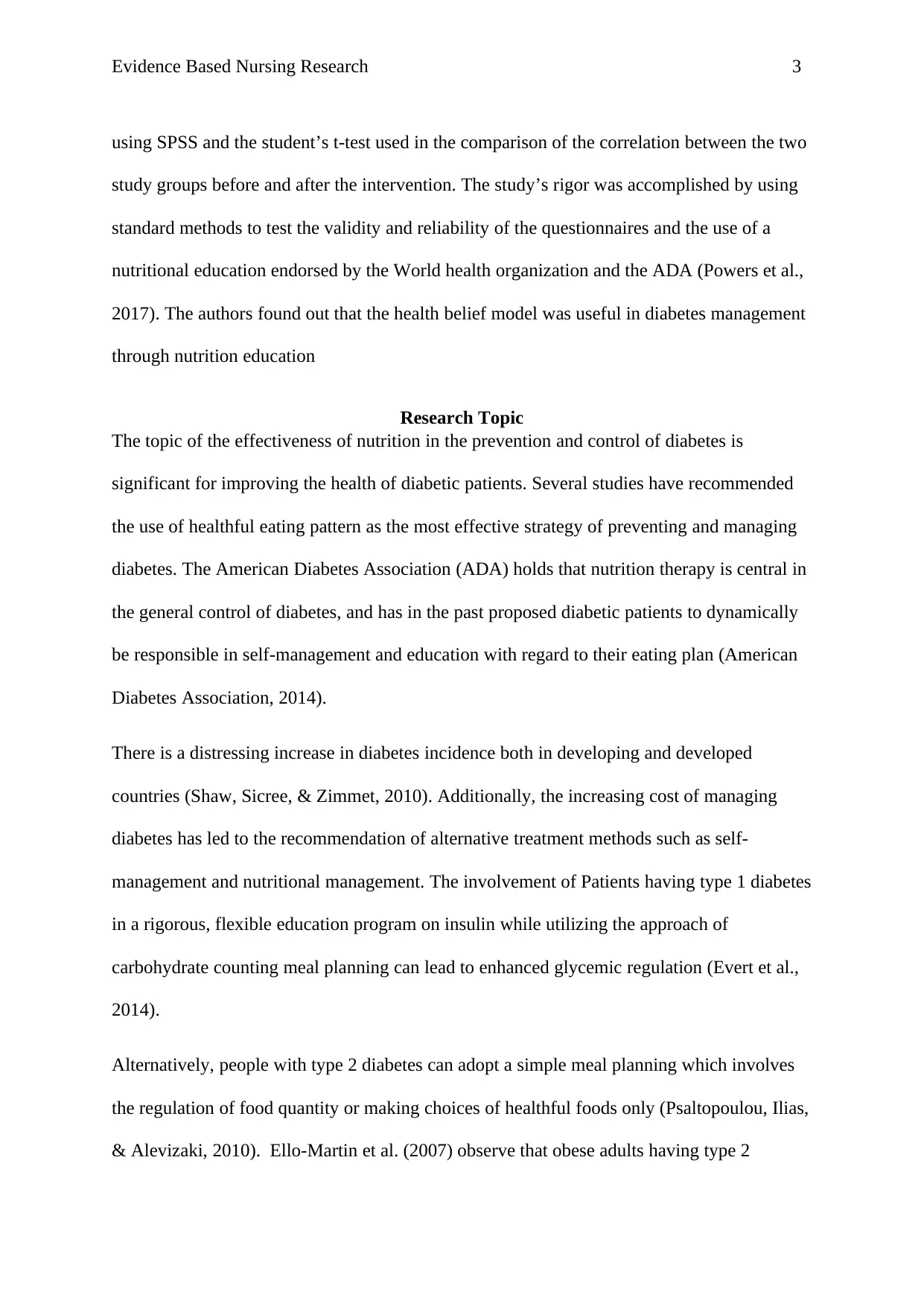
Evidence Based Nursing Research 3
using SPSS and the student’s t-test used in the comparison of the correlation between the two
study groups before and after the intervention. The study’s rigor was accomplished by using
standard methods to test the validity and reliability of the questionnaires and the use of a
nutritional education endorsed by the World health organization and the ADA (Powers et al.,
2017). The authors found out that the health belief model was useful in diabetes management
through nutrition education
Research Topic
The topic of the effectiveness of nutrition in the prevention and control of diabetes is
significant for improving the health of diabetic patients. Several studies have recommended
the use of healthful eating pattern as the most effective strategy of preventing and managing
diabetes. The American Diabetes Association (ADA) holds that nutrition therapy is central in
the general control of diabetes, and has in the past proposed diabetic patients to dynamically
be responsible in self-management and education with regard to their eating plan (American
Diabetes Association, 2014).
There is a distressing increase in diabetes incidence both in developing and developed
countries (Shaw, Sicree, & Zimmet, 2010). Additionally, the increasing cost of managing
diabetes has led to the recommendation of alternative treatment methods such as self-
management and nutritional management. The involvement of Patients having type 1 diabetes
in a rigorous, flexible education program on insulin while utilizing the approach of
carbohydrate counting meal planning can lead to enhanced glycemic regulation (Evert et al.,
2014).
Alternatively, people with type 2 diabetes can adopt a simple meal planning which involves
the regulation of food quantity or making choices of healthful foods only (Psaltopoulou, Ilias,
& Alevizaki, 2010). Ello-Martin et al. (2007) observe that obese adults having type 2
using SPSS and the student’s t-test used in the comparison of the correlation between the two
study groups before and after the intervention. The study’s rigor was accomplished by using
standard methods to test the validity and reliability of the questionnaires and the use of a
nutritional education endorsed by the World health organization and the ADA (Powers et al.,
2017). The authors found out that the health belief model was useful in diabetes management
through nutrition education
Research Topic
The topic of the effectiveness of nutrition in the prevention and control of diabetes is
significant for improving the health of diabetic patients. Several studies have recommended
the use of healthful eating pattern as the most effective strategy of preventing and managing
diabetes. The American Diabetes Association (ADA) holds that nutrition therapy is central in
the general control of diabetes, and has in the past proposed diabetic patients to dynamically
be responsible in self-management and education with regard to their eating plan (American
Diabetes Association, 2014).
There is a distressing increase in diabetes incidence both in developing and developed
countries (Shaw, Sicree, & Zimmet, 2010). Additionally, the increasing cost of managing
diabetes has led to the recommendation of alternative treatment methods such as self-
management and nutritional management. The involvement of Patients having type 1 diabetes
in a rigorous, flexible education program on insulin while utilizing the approach of
carbohydrate counting meal planning can lead to enhanced glycemic regulation (Evert et al.,
2014).
Alternatively, people with type 2 diabetes can adopt a simple meal planning which involves
the regulation of food quantity or making choices of healthful foods only (Psaltopoulou, Ilias,
& Alevizaki, 2010). Ello-Martin et al. (2007) observe that obese adults having type 2
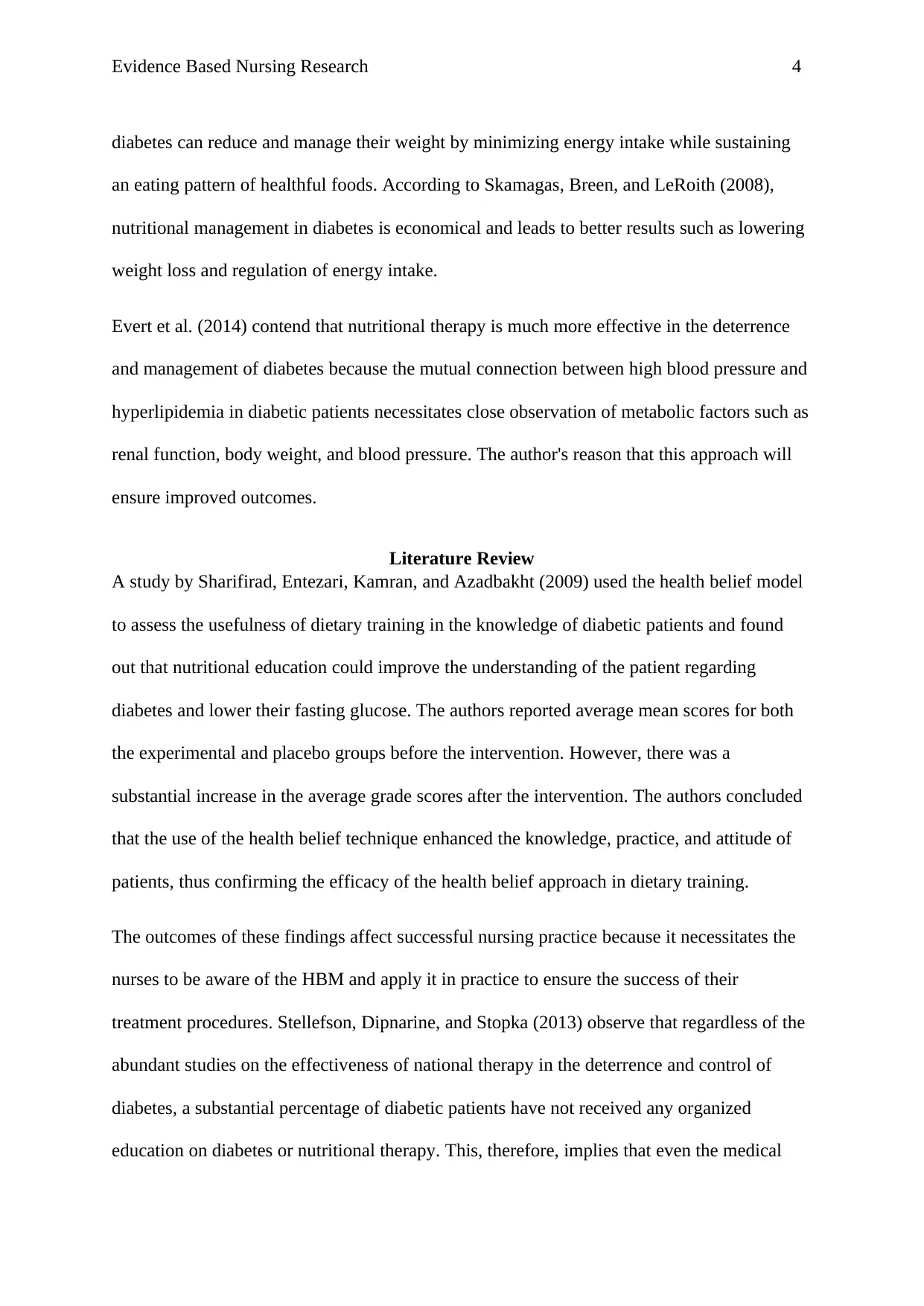
Evidence Based Nursing Research 4
diabetes can reduce and manage their weight by minimizing energy intake while sustaining
an eating pattern of healthful foods. According to Skamagas, Breen, and LeRoith (2008),
nutritional management in diabetes is economical and leads to better results such as lowering
weight loss and regulation of energy intake.
Evert et al. (2014) contend that nutritional therapy is much more effective in the deterrence
and management of diabetes because the mutual connection between high blood pressure and
hyperlipidemia in diabetic patients necessitates close observation of metabolic factors such as
renal function, body weight, and blood pressure. The author's reason that this approach will
ensure improved outcomes.
Literature Review
A study by Sharifirad, Entezari, Kamran, and Azadbakht (2009) used the health belief model
to assess the usefulness of dietary training in the knowledge of diabetic patients and found
out that nutritional education could improve the understanding of the patient regarding
diabetes and lower their fasting glucose. The authors reported average mean scores for both
the experimental and placebo groups before the intervention. However, there was a
substantial increase in the average grade scores after the intervention. The authors concluded
that the use of the health belief technique enhanced the knowledge, practice, and attitude of
patients, thus confirming the efficacy of the health belief approach in dietary training.
The outcomes of these findings affect successful nursing practice because it necessitates the
nurses to be aware of the HBM and apply it in practice to ensure the success of their
treatment procedures. Stellefson, Dipnarine, and Stopka (2013) observe that regardless of the
abundant studies on the effectiveness of national therapy in the deterrence and control of
diabetes, a substantial percentage of diabetic patients have not received any organized
education on diabetes or nutritional therapy. This, therefore, implies that even the medical
diabetes can reduce and manage their weight by minimizing energy intake while sustaining
an eating pattern of healthful foods. According to Skamagas, Breen, and LeRoith (2008),
nutritional management in diabetes is economical and leads to better results such as lowering
weight loss and regulation of energy intake.
Evert et al. (2014) contend that nutritional therapy is much more effective in the deterrence
and management of diabetes because the mutual connection between high blood pressure and
hyperlipidemia in diabetic patients necessitates close observation of metabolic factors such as
renal function, body weight, and blood pressure. The author's reason that this approach will
ensure improved outcomes.
Literature Review
A study by Sharifirad, Entezari, Kamran, and Azadbakht (2009) used the health belief model
to assess the usefulness of dietary training in the knowledge of diabetic patients and found
out that nutritional education could improve the understanding of the patient regarding
diabetes and lower their fasting glucose. The authors reported average mean scores for both
the experimental and placebo groups before the intervention. However, there was a
substantial increase in the average grade scores after the intervention. The authors concluded
that the use of the health belief technique enhanced the knowledge, practice, and attitude of
patients, thus confirming the efficacy of the health belief approach in dietary training.
The outcomes of these findings affect successful nursing practice because it necessitates the
nurses to be aware of the HBM and apply it in practice to ensure the success of their
treatment procedures. Stellefson, Dipnarine, and Stopka (2013) observe that regardless of the
abundant studies on the effectiveness of national therapy in the deterrence and control of
diabetes, a substantial percentage of diabetic patients have not received any organized
education on diabetes or nutritional therapy. This, therefore, implies that even the medical
Secure Best Marks with AI Grader
Need help grading? Try our AI Grader for instant feedback on your assignments.
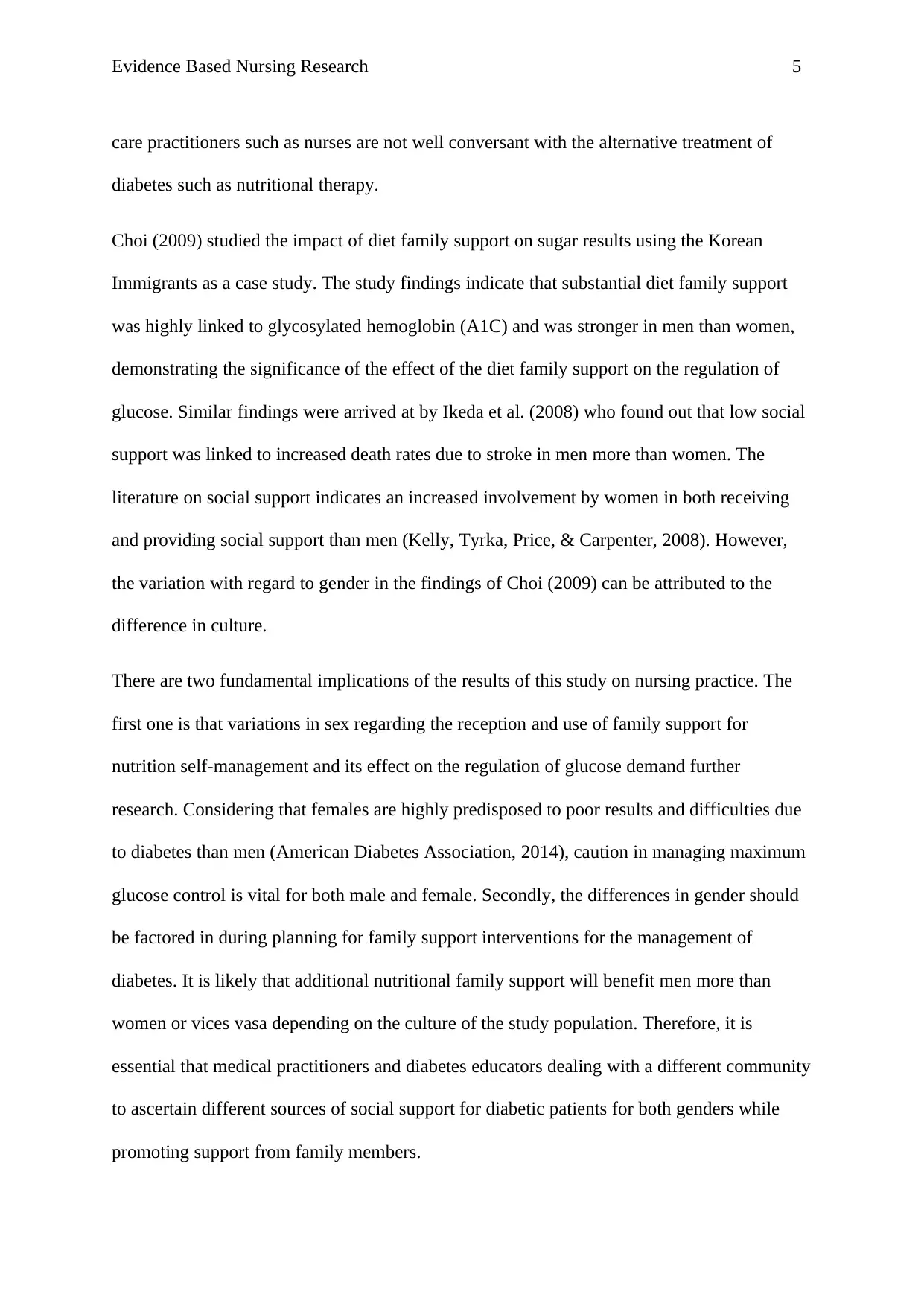
Evidence Based Nursing Research 5
care practitioners such as nurses are not well conversant with the alternative treatment of
diabetes such as nutritional therapy.
Choi (2009) studied the impact of diet family support on sugar results using the Korean
Immigrants as a case study. The study findings indicate that substantial diet family support
was highly linked to glycosylated hemoglobin (A1C) and was stronger in men than women,
demonstrating the significance of the effect of the diet family support on the regulation of
glucose. Similar findings were arrived at by Ikeda et al. (2008) who found out that low social
support was linked to increased death rates due to stroke in men more than women. The
literature on social support indicates an increased involvement by women in both receiving
and providing social support than men (Kelly, Tyrka, Price, & Carpenter, 2008). However,
the variation with regard to gender in the findings of Choi (2009) can be attributed to the
difference in culture.
There are two fundamental implications of the results of this study on nursing practice. The
first one is that variations in sex regarding the reception and use of family support for
nutrition self-management and its effect on the regulation of glucose demand further
research. Considering that females are highly predisposed to poor results and difficulties due
to diabetes than men (American Diabetes Association, 2014), caution in managing maximum
glucose control is vital for both male and female. Secondly, the differences in gender should
be factored in during planning for family support interventions for the management of
diabetes. It is likely that additional nutritional family support will benefit men more than
women or vices vasa depending on the culture of the study population. Therefore, it is
essential that medical practitioners and diabetes educators dealing with a different community
to ascertain different sources of social support for diabetic patients for both genders while
promoting support from family members.
care practitioners such as nurses are not well conversant with the alternative treatment of
diabetes such as nutritional therapy.
Choi (2009) studied the impact of diet family support on sugar results using the Korean
Immigrants as a case study. The study findings indicate that substantial diet family support
was highly linked to glycosylated hemoglobin (A1C) and was stronger in men than women,
demonstrating the significance of the effect of the diet family support on the regulation of
glucose. Similar findings were arrived at by Ikeda et al. (2008) who found out that low social
support was linked to increased death rates due to stroke in men more than women. The
literature on social support indicates an increased involvement by women in both receiving
and providing social support than men (Kelly, Tyrka, Price, & Carpenter, 2008). However,
the variation with regard to gender in the findings of Choi (2009) can be attributed to the
difference in culture.
There are two fundamental implications of the results of this study on nursing practice. The
first one is that variations in sex regarding the reception and use of family support for
nutrition self-management and its effect on the regulation of glucose demand further
research. Considering that females are highly predisposed to poor results and difficulties due
to diabetes than men (American Diabetes Association, 2014), caution in managing maximum
glucose control is vital for both male and female. Secondly, the differences in gender should
be factored in during planning for family support interventions for the management of
diabetes. It is likely that additional nutritional family support will benefit men more than
women or vices vasa depending on the culture of the study population. Therefore, it is
essential that medical practitioners and diabetes educators dealing with a different community
to ascertain different sources of social support for diabetic patients for both genders while
promoting support from family members.
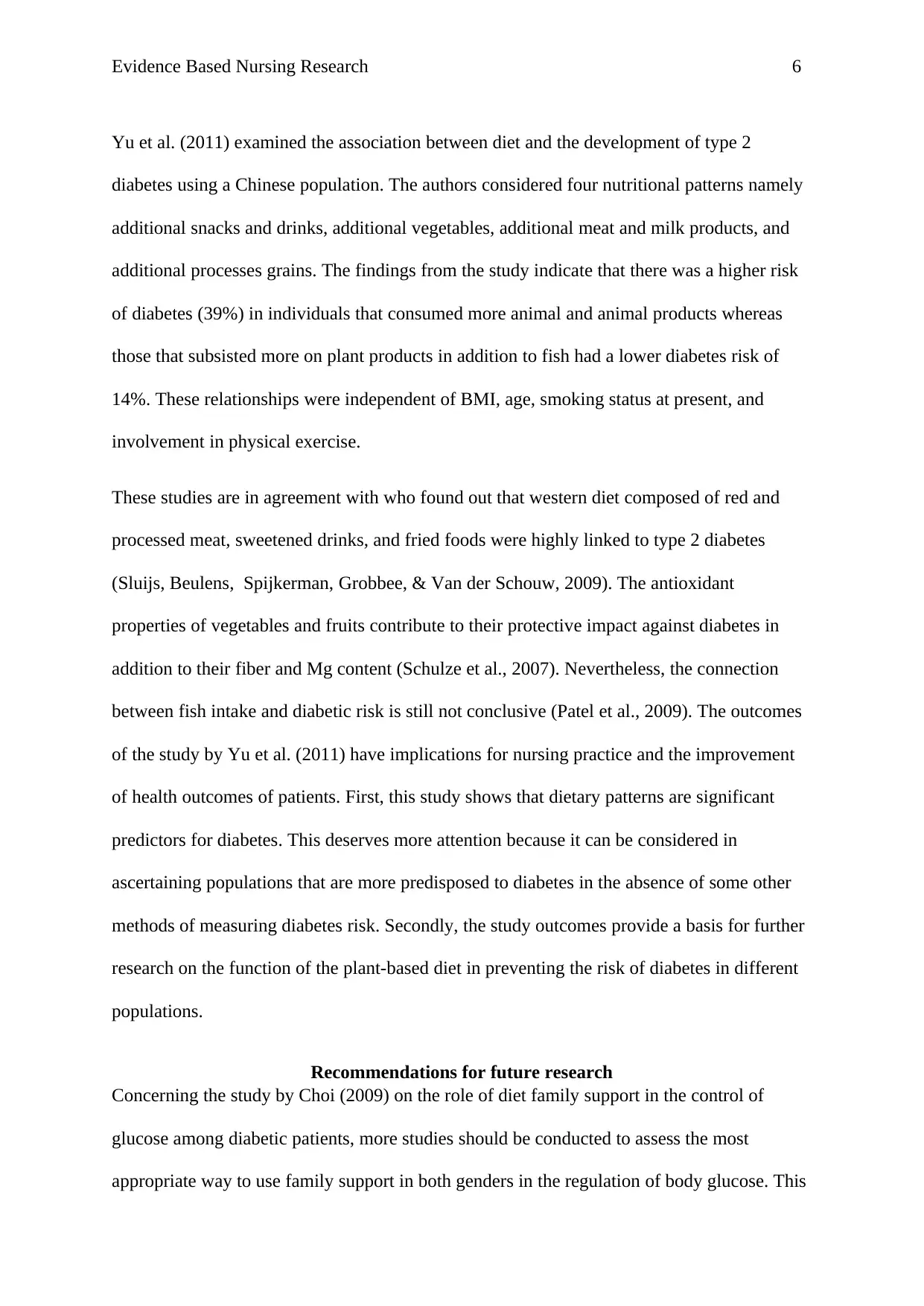
Evidence Based Nursing Research 6
Yu et al. (2011) examined the association between diet and the development of type 2
diabetes using a Chinese population. The authors considered four nutritional patterns namely
additional snacks and drinks, additional vegetables, additional meat and milk products, and
additional processes grains. The findings from the study indicate that there was a higher risk
of diabetes (39%) in individuals that consumed more animal and animal products whereas
those that subsisted more on plant products in addition to fish had a lower diabetes risk of
14%. These relationships were independent of BMI, age, smoking status at present, and
involvement in physical exercise.
These studies are in agreement with who found out that western diet composed of red and
processed meat, sweetened drinks, and fried foods were highly linked to type 2 diabetes
(Sluijs, Beulens, Spijkerman, Grobbee, & Van der Schouw, 2009). The antioxidant
properties of vegetables and fruits contribute to their protective impact against diabetes in
addition to their fiber and Mg content (Schulze et al., 2007). Nevertheless, the connection
between fish intake and diabetic risk is still not conclusive (Patel et al., 2009). The outcomes
of the study by Yu et al. (2011) have implications for nursing practice and the improvement
of health outcomes of patients. First, this study shows that dietary patterns are significant
predictors for diabetes. This deserves more attention because it can be considered in
ascertaining populations that are more predisposed to diabetes in the absence of some other
methods of measuring diabetes risk. Secondly, the study outcomes provide a basis for further
research on the function of the plant-based diet in preventing the risk of diabetes in different
populations.
Recommendations for future research
Concerning the study by Choi (2009) on the role of diet family support in the control of
glucose among diabetic patients, more studies should be conducted to assess the most
appropriate way to use family support in both genders in the regulation of body glucose. This
Yu et al. (2011) examined the association between diet and the development of type 2
diabetes using a Chinese population. The authors considered four nutritional patterns namely
additional snacks and drinks, additional vegetables, additional meat and milk products, and
additional processes grains. The findings from the study indicate that there was a higher risk
of diabetes (39%) in individuals that consumed more animal and animal products whereas
those that subsisted more on plant products in addition to fish had a lower diabetes risk of
14%. These relationships were independent of BMI, age, smoking status at present, and
involvement in physical exercise.
These studies are in agreement with who found out that western diet composed of red and
processed meat, sweetened drinks, and fried foods were highly linked to type 2 diabetes
(Sluijs, Beulens, Spijkerman, Grobbee, & Van der Schouw, 2009). The antioxidant
properties of vegetables and fruits contribute to their protective impact against diabetes in
addition to their fiber and Mg content (Schulze et al., 2007). Nevertheless, the connection
between fish intake and diabetic risk is still not conclusive (Patel et al., 2009). The outcomes
of the study by Yu et al. (2011) have implications for nursing practice and the improvement
of health outcomes of patients. First, this study shows that dietary patterns are significant
predictors for diabetes. This deserves more attention because it can be considered in
ascertaining populations that are more predisposed to diabetes in the absence of some other
methods of measuring diabetes risk. Secondly, the study outcomes provide a basis for further
research on the function of the plant-based diet in preventing the risk of diabetes in different
populations.
Recommendations for future research
Concerning the study by Choi (2009) on the role of diet family support in the control of
glucose among diabetic patients, more studies should be conducted to assess the most
appropriate way to use family support in both genders in the regulation of body glucose. This
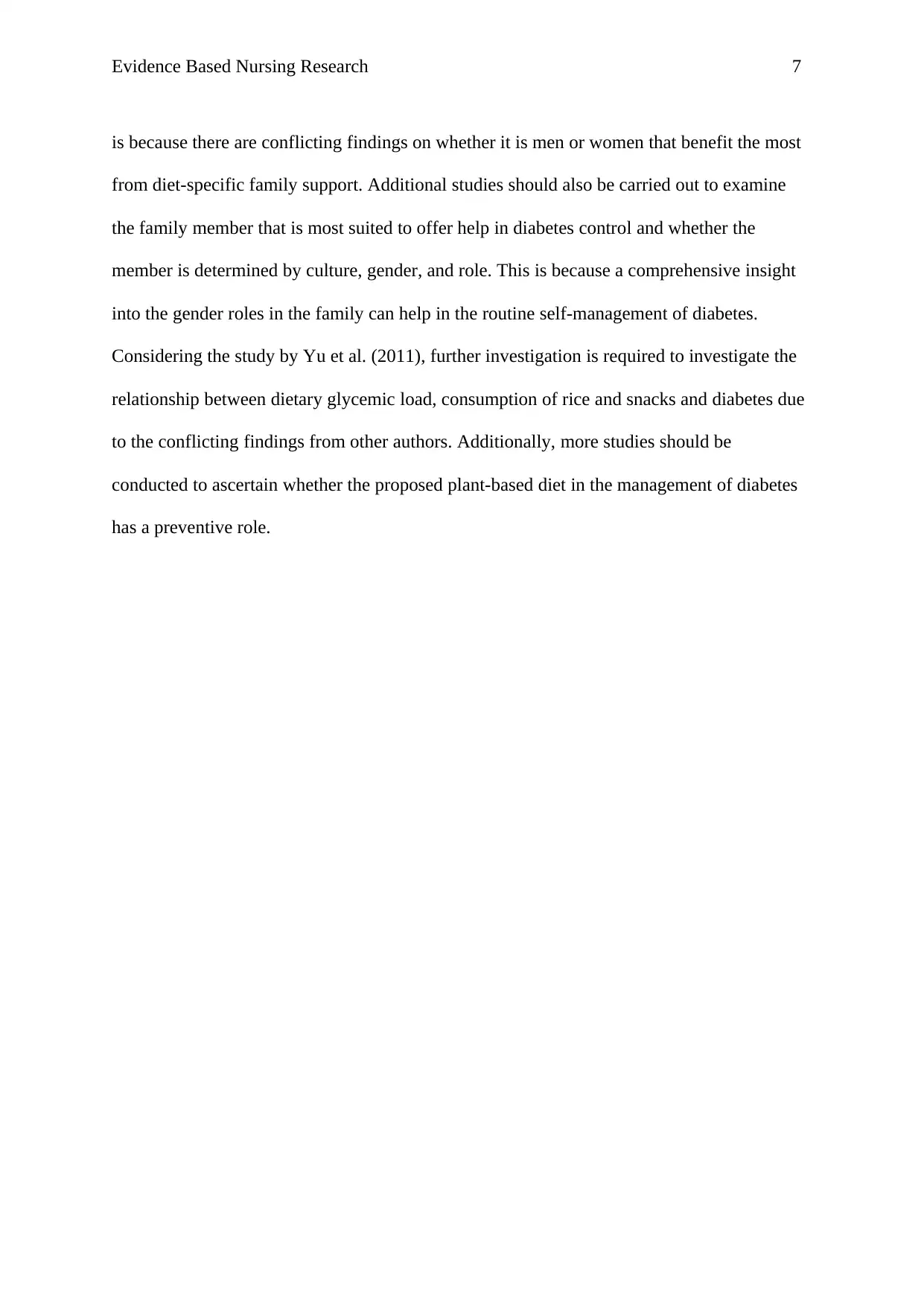
Evidence Based Nursing Research 7
is because there are conflicting findings on whether it is men or women that benefit the most
from diet-specific family support. Additional studies should also be carried out to examine
the family member that is most suited to offer help in diabetes control and whether the
member is determined by culture, gender, and role. This is because a comprehensive insight
into the gender roles in the family can help in the routine self-management of diabetes.
Considering the study by Yu et al. (2011), further investigation is required to investigate the
relationship between dietary glycemic load, consumption of rice and snacks and diabetes due
to the conflicting findings from other authors. Additionally, more studies should be
conducted to ascertain whether the proposed plant-based diet in the management of diabetes
has a preventive role.
is because there are conflicting findings on whether it is men or women that benefit the most
from diet-specific family support. Additional studies should also be carried out to examine
the family member that is most suited to offer help in diabetes control and whether the
member is determined by culture, gender, and role. This is because a comprehensive insight
into the gender roles in the family can help in the routine self-management of diabetes.
Considering the study by Yu et al. (2011), further investigation is required to investigate the
relationship between dietary glycemic load, consumption of rice and snacks and diabetes due
to the conflicting findings from other authors. Additionally, more studies should be
conducted to ascertain whether the proposed plant-based diet in the management of diabetes
has a preventive role.
Paraphrase This Document
Need a fresh take? Get an instant paraphrase of this document with our AI Paraphraser
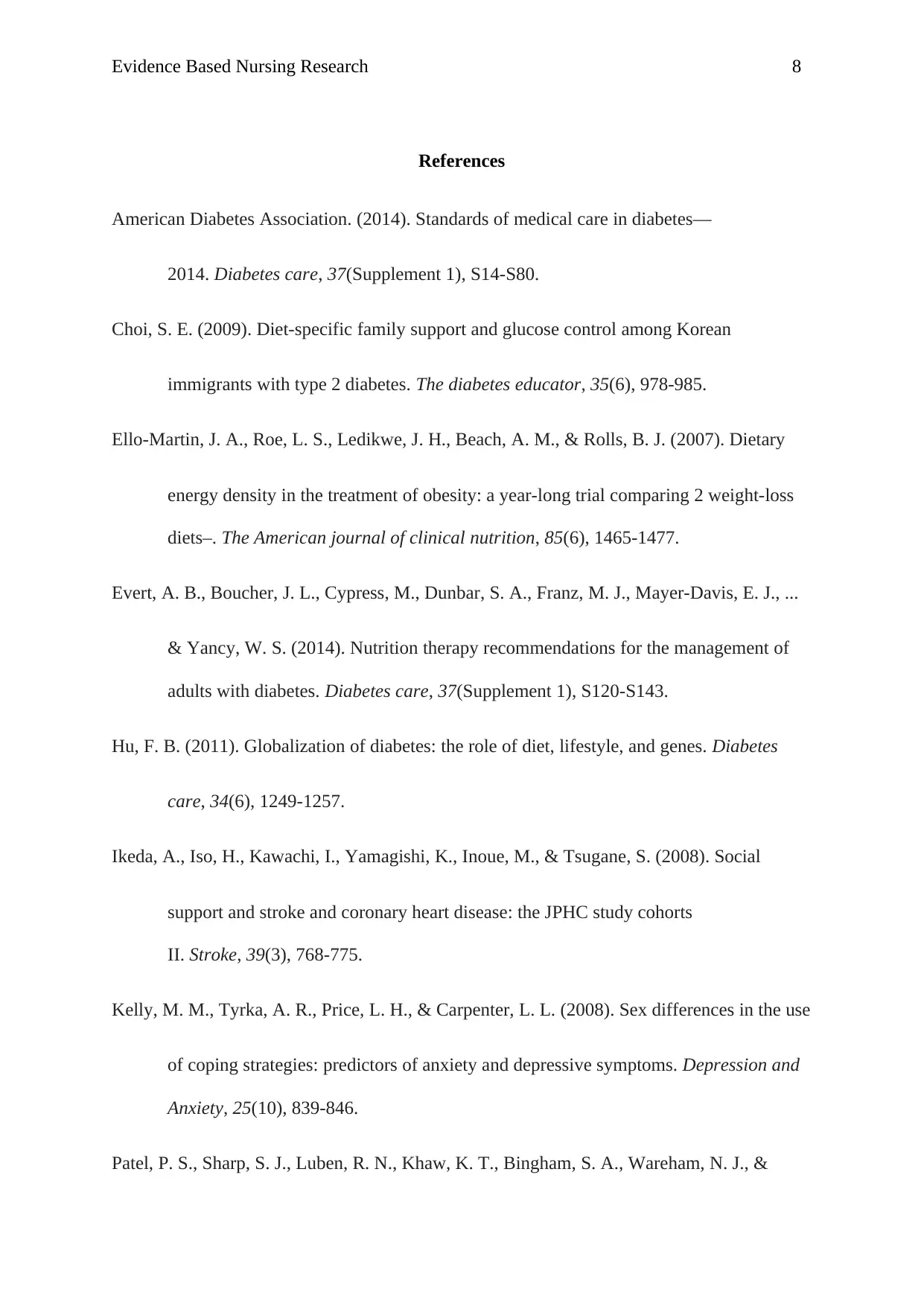
Evidence Based Nursing Research 8
References
American Diabetes Association. (2014). Standards of medical care in diabetes—
2014. Diabetes care, 37(Supplement 1), S14-S80.
Choi, S. E. (2009). Diet-specific family support and glucose control among Korean
immigrants with type 2 diabetes. The diabetes educator, 35(6), 978-985.
Ello-Martin, J. A., Roe, L. S., Ledikwe, J. H., Beach, A. M., & Rolls, B. J. (2007). Dietary
energy density in the treatment of obesity: a year-long trial comparing 2 weight-loss
diets–. The American journal of clinical nutrition, 85(6), 1465-1477.
Evert, A. B., Boucher, J. L., Cypress, M., Dunbar, S. A., Franz, M. J., Mayer-Davis, E. J., ...
& Yancy, W. S. (2014). Nutrition therapy recommendations for the management of
adults with diabetes. Diabetes care, 37(Supplement 1), S120-S143.
Hu, F. B. (2011). Globalization of diabetes: the role of diet, lifestyle, and genes. Diabetes
care, 34(6), 1249-1257.
Ikeda, A., Iso, H., Kawachi, I., Yamagishi, K., Inoue, M., & Tsugane, S. (2008). Social
support and stroke and coronary heart disease: the JPHC study cohorts
II. Stroke, 39(3), 768-775.
Kelly, M. M., Tyrka, A. R., Price, L. H., & Carpenter, L. L. (2008). Sex differences in the use
of coping strategies: predictors of anxiety and depressive symptoms. Depression and
Anxiety, 25(10), 839-846.
Patel, P. S., Sharp, S. J., Luben, R. N., Khaw, K. T., Bingham, S. A., Wareham, N. J., &
References
American Diabetes Association. (2014). Standards of medical care in diabetes—
2014. Diabetes care, 37(Supplement 1), S14-S80.
Choi, S. E. (2009). Diet-specific family support and glucose control among Korean
immigrants with type 2 diabetes. The diabetes educator, 35(6), 978-985.
Ello-Martin, J. A., Roe, L. S., Ledikwe, J. H., Beach, A. M., & Rolls, B. J. (2007). Dietary
energy density in the treatment of obesity: a year-long trial comparing 2 weight-loss
diets–. The American journal of clinical nutrition, 85(6), 1465-1477.
Evert, A. B., Boucher, J. L., Cypress, M., Dunbar, S. A., Franz, M. J., Mayer-Davis, E. J., ...
& Yancy, W. S. (2014). Nutrition therapy recommendations for the management of
adults with diabetes. Diabetes care, 37(Supplement 1), S120-S143.
Hu, F. B. (2011). Globalization of diabetes: the role of diet, lifestyle, and genes. Diabetes
care, 34(6), 1249-1257.
Ikeda, A., Iso, H., Kawachi, I., Yamagishi, K., Inoue, M., & Tsugane, S. (2008). Social
support and stroke and coronary heart disease: the JPHC study cohorts
II. Stroke, 39(3), 768-775.
Kelly, M. M., Tyrka, A. R., Price, L. H., & Carpenter, L. L. (2008). Sex differences in the use
of coping strategies: predictors of anxiety and depressive symptoms. Depression and
Anxiety, 25(10), 839-846.
Patel, P. S., Sharp, S. J., Luben, R. N., Khaw, K. T., Bingham, S. A., Wareham, N. J., &
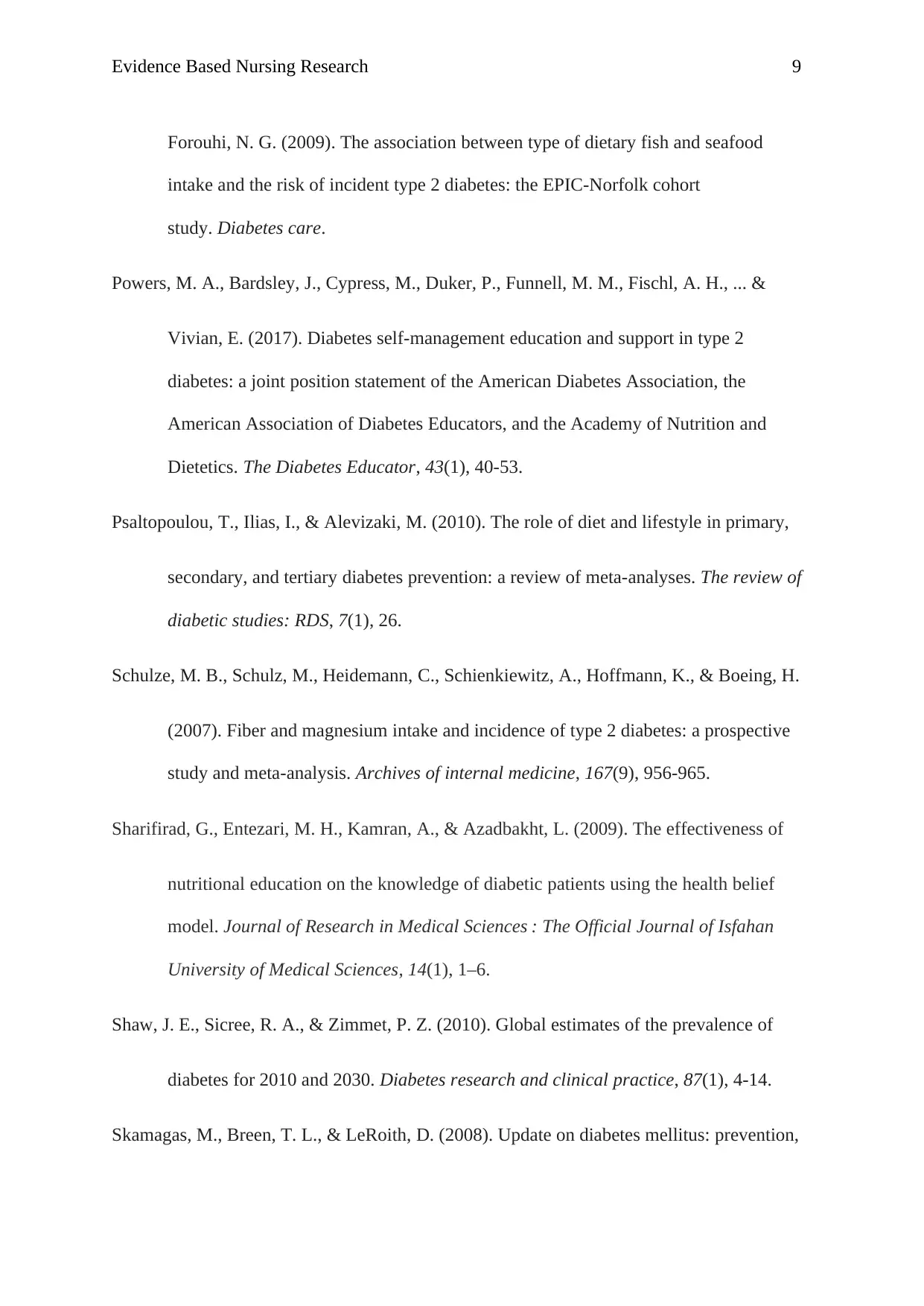
Evidence Based Nursing Research 9
Forouhi, N. G. (2009). The association between type of dietary fish and seafood
intake and the risk of incident type 2 diabetes: the EPIC-Norfolk cohort
study. Diabetes care.
Powers, M. A., Bardsley, J., Cypress, M., Duker, P., Funnell, M. M., Fischl, A. H., ... &
Vivian, E. (2017). Diabetes self-management education and support in type 2
diabetes: a joint position statement of the American Diabetes Association, the
American Association of Diabetes Educators, and the Academy of Nutrition and
Dietetics. The Diabetes Educator, 43(1), 40-53.
Psaltopoulou, T., Ilias, I., & Alevizaki, M. (2010). The role of diet and lifestyle in primary,
secondary, and tertiary diabetes prevention: a review of meta-analyses. The review of
diabetic studies: RDS, 7(1), 26.
Schulze, M. B., Schulz, M., Heidemann, C., Schienkiewitz, A., Hoffmann, K., & Boeing, H.
(2007). Fiber and magnesium intake and incidence of type 2 diabetes: a prospective
study and meta-analysis. Archives of internal medicine, 167(9), 956-965.
Sharifirad, G., Entezari, M. H., Kamran, A., & Azadbakht, L. (2009). The effectiveness of
nutritional education on the knowledge of diabetic patients using the health belief
model. Journal of Research in Medical Sciences : The Official Journal of Isfahan
University of Medical Sciences, 14(1), 1–6.
Shaw, J. E., Sicree, R. A., & Zimmet, P. Z. (2010). Global estimates of the prevalence of
diabetes for 2010 and 2030. Diabetes research and clinical practice, 87(1), 4-14.
Skamagas, M., Breen, T. L., & LeRoith, D. (2008). Update on diabetes mellitus: prevention,
Forouhi, N. G. (2009). The association between type of dietary fish and seafood
intake and the risk of incident type 2 diabetes: the EPIC-Norfolk cohort
study. Diabetes care.
Powers, M. A., Bardsley, J., Cypress, M., Duker, P., Funnell, M. M., Fischl, A. H., ... &
Vivian, E. (2017). Diabetes self-management education and support in type 2
diabetes: a joint position statement of the American Diabetes Association, the
American Association of Diabetes Educators, and the Academy of Nutrition and
Dietetics. The Diabetes Educator, 43(1), 40-53.
Psaltopoulou, T., Ilias, I., & Alevizaki, M. (2010). The role of diet and lifestyle in primary,
secondary, and tertiary diabetes prevention: a review of meta-analyses. The review of
diabetic studies: RDS, 7(1), 26.
Schulze, M. B., Schulz, M., Heidemann, C., Schienkiewitz, A., Hoffmann, K., & Boeing, H.
(2007). Fiber and magnesium intake and incidence of type 2 diabetes: a prospective
study and meta-analysis. Archives of internal medicine, 167(9), 956-965.
Sharifirad, G., Entezari, M. H., Kamran, A., & Azadbakht, L. (2009). The effectiveness of
nutritional education on the knowledge of diabetic patients using the health belief
model. Journal of Research in Medical Sciences : The Official Journal of Isfahan
University of Medical Sciences, 14(1), 1–6.
Shaw, J. E., Sicree, R. A., & Zimmet, P. Z. (2010). Global estimates of the prevalence of
diabetes for 2010 and 2030. Diabetes research and clinical practice, 87(1), 4-14.
Skamagas, M., Breen, T. L., & LeRoith, D. (2008). Update on diabetes mellitus: prevention,
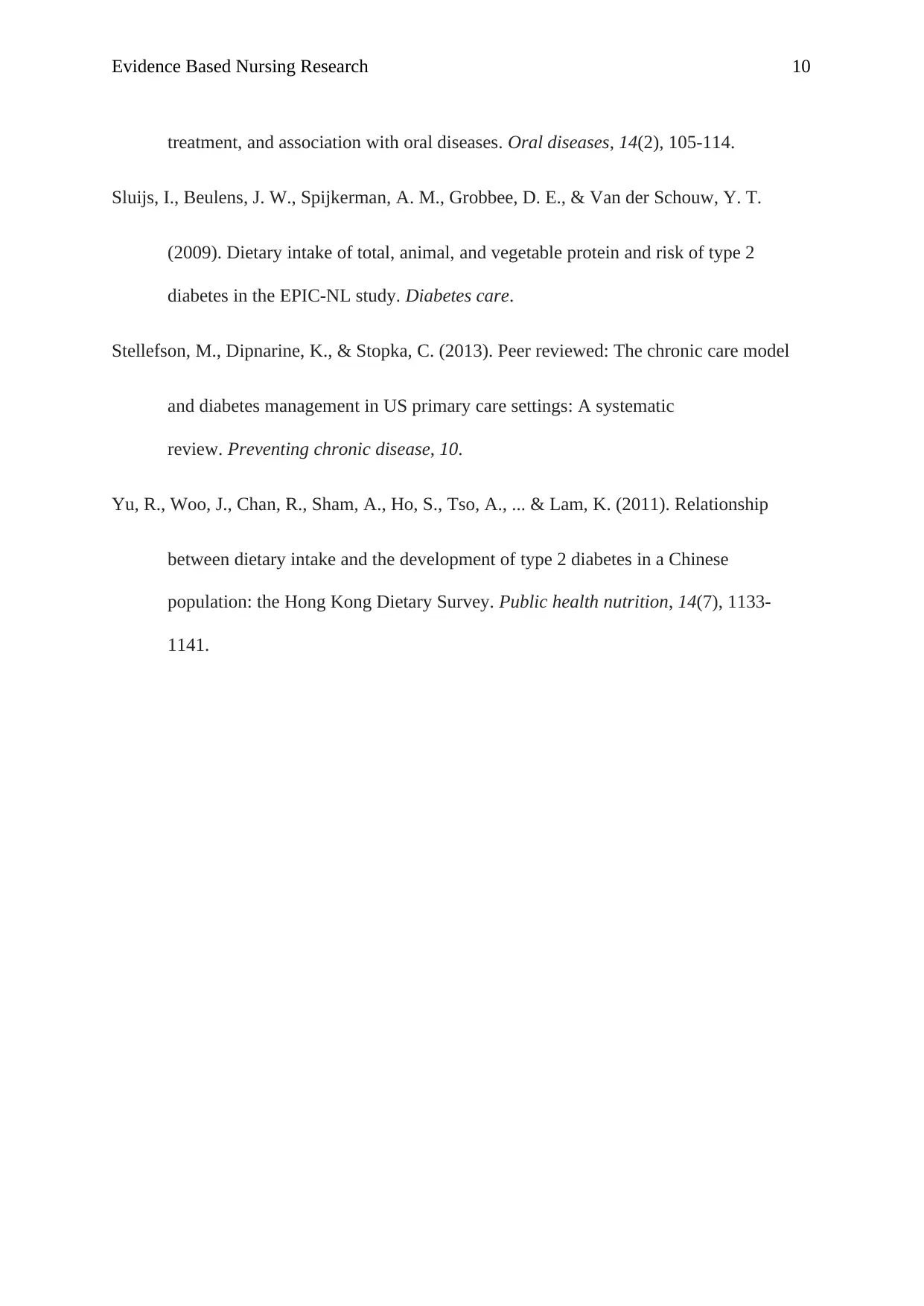
Evidence Based Nursing Research 10
treatment, and association with oral diseases. Oral diseases, 14(2), 105-114.
Sluijs, I., Beulens, J. W., Spijkerman, A. M., Grobbee, D. E., & Van der Schouw, Y. T.
(2009). Dietary intake of total, animal, and vegetable protein and risk of type 2
diabetes in the EPIC-NL study. Diabetes care.
Stellefson, M., Dipnarine, K., & Stopka, C. (2013). Peer reviewed: The chronic care model
and diabetes management in US primary care settings: A systematic
review. Preventing chronic disease, 10.
Yu, R., Woo, J., Chan, R., Sham, A., Ho, S., Tso, A., ... & Lam, K. (2011). Relationship
between dietary intake and the development of type 2 diabetes in a Chinese
population: the Hong Kong Dietary Survey. Public health nutrition, 14(7), 1133-
1141.
treatment, and association with oral diseases. Oral diseases, 14(2), 105-114.
Sluijs, I., Beulens, J. W., Spijkerman, A. M., Grobbee, D. E., & Van der Schouw, Y. T.
(2009). Dietary intake of total, animal, and vegetable protein and risk of type 2
diabetes in the EPIC-NL study. Diabetes care.
Stellefson, M., Dipnarine, K., & Stopka, C. (2013). Peer reviewed: The chronic care model
and diabetes management in US primary care settings: A systematic
review. Preventing chronic disease, 10.
Yu, R., Woo, J., Chan, R., Sham, A., Ho, S., Tso, A., ... & Lam, K. (2011). Relationship
between dietary intake and the development of type 2 diabetes in a Chinese
population: the Hong Kong Dietary Survey. Public health nutrition, 14(7), 1133-
1141.
Secure Best Marks with AI Grader
Need help grading? Try our AI Grader for instant feedback on your assignments.
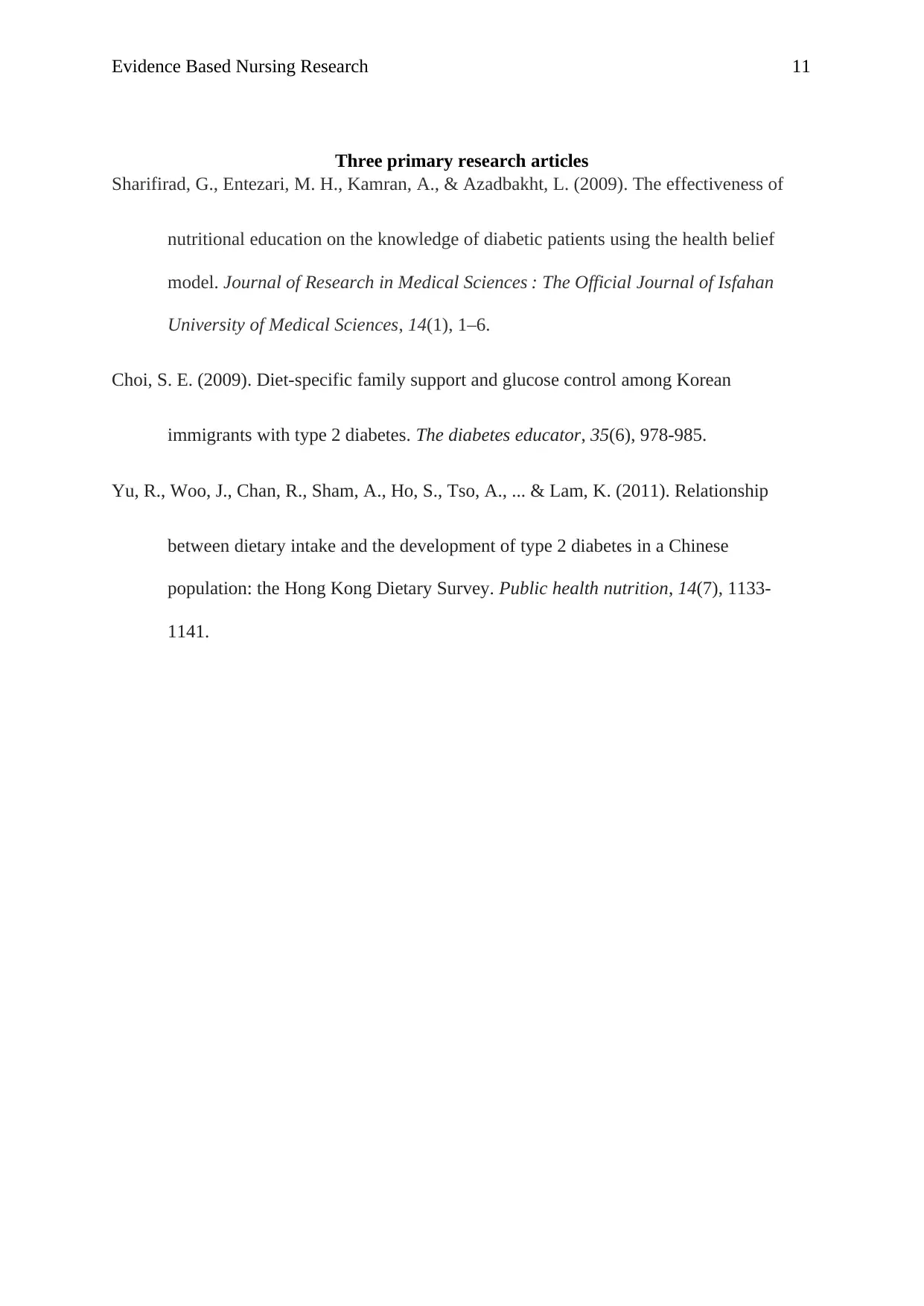
Evidence Based Nursing Research 11
Three primary research articles
Sharifirad, G., Entezari, M. H., Kamran, A., & Azadbakht, L. (2009). The effectiveness of
nutritional education on the knowledge of diabetic patients using the health belief
model. Journal of Research in Medical Sciences : The Official Journal of Isfahan
University of Medical Sciences, 14(1), 1–6.
Choi, S. E. (2009). Diet-specific family support and glucose control among Korean
immigrants with type 2 diabetes. The diabetes educator, 35(6), 978-985.
Yu, R., Woo, J., Chan, R., Sham, A., Ho, S., Tso, A., ... & Lam, K. (2011). Relationship
between dietary intake and the development of type 2 diabetes in a Chinese
population: the Hong Kong Dietary Survey. Public health nutrition, 14(7), 1133-
1141.
Three primary research articles
Sharifirad, G., Entezari, M. H., Kamran, A., & Azadbakht, L. (2009). The effectiveness of
nutritional education on the knowledge of diabetic patients using the health belief
model. Journal of Research in Medical Sciences : The Official Journal of Isfahan
University of Medical Sciences, 14(1), 1–6.
Choi, S. E. (2009). Diet-specific family support and glucose control among Korean
immigrants with type 2 diabetes. The diabetes educator, 35(6), 978-985.
Yu, R., Woo, J., Chan, R., Sham, A., Ho, S., Tso, A., ... & Lam, K. (2011). Relationship
between dietary intake and the development of type 2 diabetes in a Chinese
population: the Hong Kong Dietary Survey. Public health nutrition, 14(7), 1133-
1141.
1 out of 11
Related Documents
Your All-in-One AI-Powered Toolkit for Academic Success.
+13062052269
info@desklib.com
Available 24*7 on WhatsApp / Email
![[object Object]](/_next/static/media/star-bottom.7253800d.svg)
Unlock your academic potential
© 2024 | Zucol Services PVT LTD | All rights reserved.




